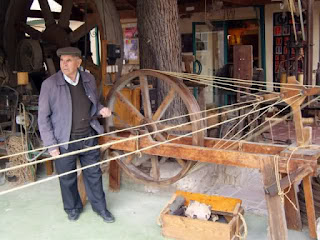Welcome. This post is about a fiesta in Calabardina and follows on from my last post.( If you would like to read that one first just scroll further down the page).
 Having encountered assorted divers on the jetty, the statue of the Virgin was carried up and down two or three streets to the accompaniment of a band. Some houses had decorated crosses hung up outside.
Having encountered assorted divers on the jetty, the statue of the Virgin was carried up and down two or three streets to the accompaniment of a band. Some houses had decorated crosses hung up outside.There was a competition for the best decorated cross and these were displayed under the awning in the street.I think they deserved a better background..
 Whilst walking around we encountered some of our neighbours - cue an impromptu chance to practice our Spanish above the noise of the band whilst walking in a throng of people. After this we decided we needed to recuperate and went for a cup of tea, (well, we are English), and then to join everyone else on the beach.
Whilst walking around we encountered some of our neighbours - cue an impromptu chance to practice our Spanish above the noise of the band whilst walking in a throng of people. After this we decided we needed to recuperate and went for a cup of tea, (well, we are English), and then to join everyone else on the beach.Something that hasn't changed here is the importance of the family. Most outings and events seem to involve a minimum of ten people. In many households extended families of between eight and twenty people will all lunch together every Sunday. On birthdays and other celebrations it's obligatory to invite the entire family. May is the month for first communions and weddings. Many of our Spanish friends have been to events involving two or three hundred members of the family for three week-ends in a row during this month.

On the beach, as elsewhere, Spanish people like to be close. They are exceptionally friendly to everyone and the concept of having your own space simply doesn't exist!
We'd read on a poster that we'd be able to buy a portion of paella at around two thirty so we went along.When we arrived at three p.m. it was (to our astonishmen) in full swing. (Normally everything is at least half an hour later than announced.)
This photo shows everyone under the awning in the middle of the street - a little like the recent Jubilee celebrations in Britain, but without the obligatory British weather!

It tasted delicious, and at three Euros a portion (about £2.75) this particular Brit thought it was great value.
I hope you have enjoyed this blog. I love getting your feedback especially from other countries such as Germany, France and the USA as well as Spain and England. If you have any comments please send them to me at: writerinaguilas@gmail.com
Espero que has gustado este blog. Me gusta mucho tener los pensamientos de gente en otros paises, como Espana, Alemania, Francia y Los Estados Unidos. Si tienes algunas pensamientos sobre el 'blog' escribes a writerinaguilas@gmail.com
One reader in Spain who enjoyed my post about the production of Esparto, (2/6/12 -scroll down to view this), sent me these photos showing two men demonstrating the craft in the museum in Cieza, Spain.
The next post will be in a fortnights time on the 15th. of July.Thanks for your company, Cathy.



















